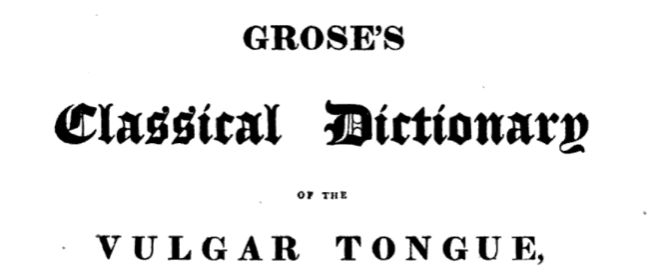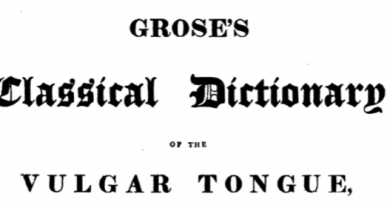Dictionary of the Vulgar Tongue – Day 251, 252 and 253
The Dictionary of the Vulgar Tongue was first published at the end of the eighteenth century, and given that the current health crisis is giving too much time to read books, I thought I’d pick a daily word from it until I got bored…. And to catch up after getting behind with these posts, and because I’m getting towards the end of the book, I’m doing three days at once now. How lovely….
Pickthank
This is defined by Grose as “a tale-bearer or mischief maker” and it evolved from meaning someone who was sycophantic, literally trying to pick up thanks. The word was first used in the late fifteenth century, was used by Shakespeare and was commonly used into the nineteenth century.
The English language is a little mysterious, or at least how it’s used, as this word remained in usage for centuries and then just faded away in the twentieth century. I prefer its original meaning, someone who always looking to curry favour with others, in order to pick up a thanks.
Pig
This definition surprised me, as Grose’s definition pre-dates the formation of most police forces. He defines it as “a police officer. A China street pig; a Bow-street officer. Floor the pig and bolt; knock down the officer and run away”. There are all kinds of stories as to why this word came into usage, some have said it’s because the police were like pigs at rooting away, to solve crimes in this case. This seems unlikely to me, it’s likely just a derogatory term which the cant community (the criminal underworld) would have used and which gained wider parlance. Interestingly, the word wasn’t much used in this meaning during the later part of the nineteenth century or the early part of the twentieth century, but then in came back into usage more recently with the same meaning.
Pig Running
This is defined by Grose as “a piece of game frequently practised at fairs, wakes, &c. A large pig, whose tail is cut short, and both soaped and greased, being turned out, is hunted by the young men and boys, and becomes the property of him who can catch him and hold him by the tail, above the height of his head”. As a reminder, a wake was a fair in the nineteenth century, this wasn’t an activity held after someone was buried. What is moderately surprising to me is that this still goes on in a few places in the United States, although animal rights concerns have caused this to start to come to a juddering halt. The activity has had numerous other names, such as pig wrestling, pig scrambling, pig catching and so on, and it went on for centuries in the UK.



